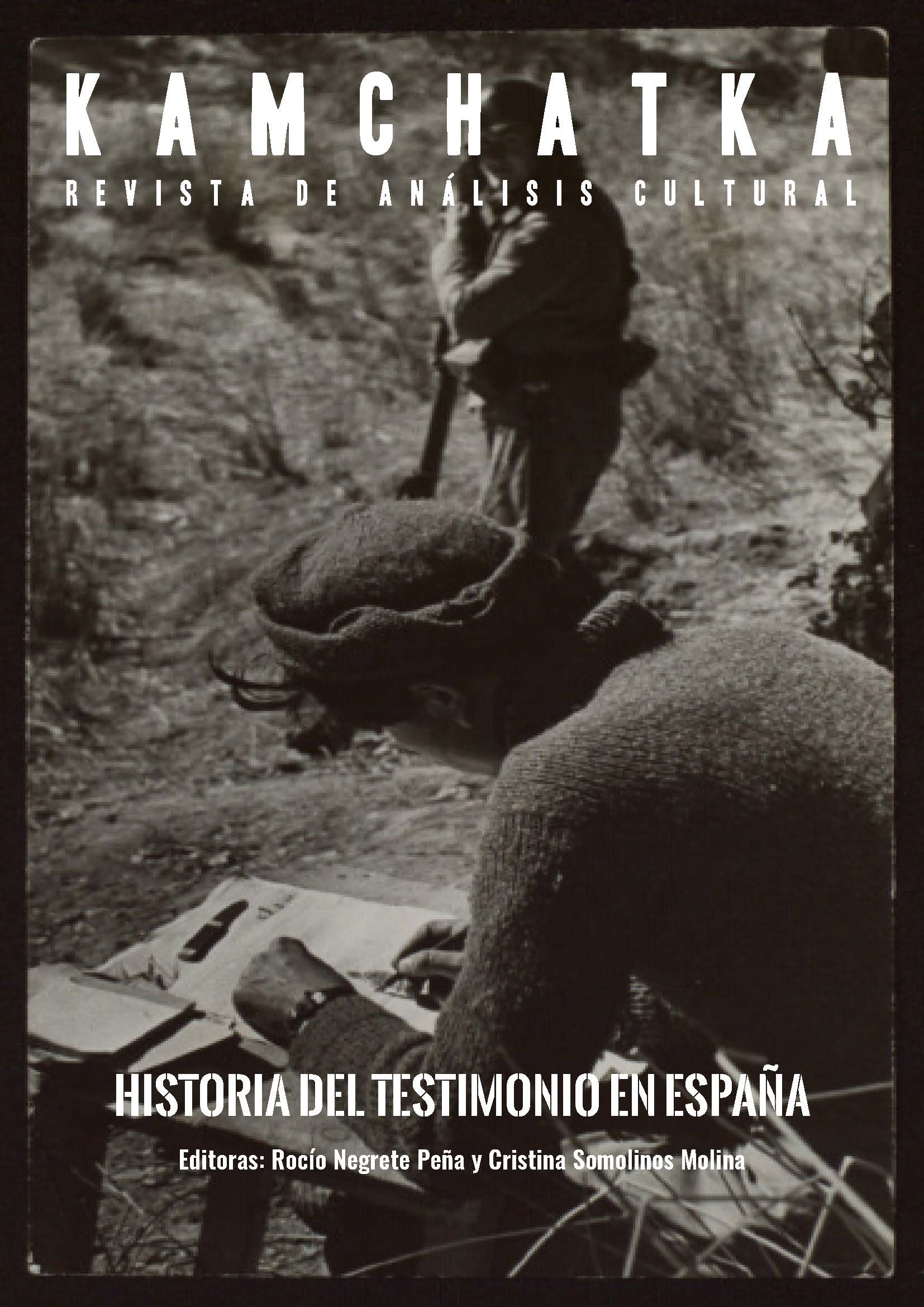Elena Fortún in "Oculto sendero", the Possibility of a Testimony
DOI:
https://doi.org/10.7203/KAM.21.24294Keywords:
Autobiography, LGBTI , Queer, Testimony, Subalternity. Abstract
Abstract
This paper aims to analyse Elena Fortún’s autobiographical novel Oculto sendero (2016) as a fundamental testimony of LGBTI+ history in Spain. To carry out this research, I propose a materialist analysis of the diegesis and the contexts to which it relates: the one of the recounted events, the one of the time of writing, i.e. when the author was finally able to begin elaborating her story, and the present, when her story is finally made public. This reception allows real testimony to take place: the testimony is only possible when her acknowledgment as a lesbian has found reception and acceptance. The construction of identity will be studied from its different aspects: as a woman, as a woman who writes in the first half of the Spanish twentieth century, as a lesbian, as a subaltern subject and as a writer who expresses her gender dissidence through the hidden and revealed narration of different experiences and statements that I will try to categorise.
 Downloads
Downloads
 References
References
Agamben, Giorgio (2000). Lo que queda de Auschwitz. El archivo y el testigo. Homo Sacer III. Valencia:
Pre-Textos.
Alberca Serrano, Manuel (2007). El pacto ambiguo: De la novela autobiográfica a la autoficción.
Madrid: Biblioteca Nueva.
Caballé, Anna (1995). Narcisos de tinta: Ensayos sobre la literatura autobiográfica en lengua castellana,
siglos XIX y XX. Málaga: Megazul.
Capdevila-Argüelles, Nuria (2021). “The Dissidence Inside Her Closet Elena Fortún versus Encarnación
Aragonés [sic] Urquijo”. Simón-Alegre, Ana Isabel y Charnon-Deutsch, Lou
(eds.). Queer Women in Modern Spanish Literature. Londres: Routledge: 84-101. (https://
doi.org/10.4324/9781003097389-6)
Fortún, Elena y Ras, Maltide (2014). El camino es nuestro. Capdevila-Argüelles, Nuria y Fraga
Fernández-Cuevas, María Jesús (eds.). Madrid: Fundación Banco Santander.
Durán Giménez-Rico, Isabel. “La estrategia del «Otro» en la autobiografía femenina americana
del siglo XX”. REDEN: Revista Española de Estudios Norteamericanos 5, (1992): 36-47.
Fortún, Elena (1987). Celia en la revolución. Dorao, Marisol (ed.). Madrid: Aguilar.
Fortún, Elena (2020b). Sabes quién soy. Cartas a Inés Field (Tomo 1). Capdevila-Argüelles, Nuria
(ed.). Sevilla: Editorial Renacimiento.
Fortún, Elena (2020c). Mujer doliente. Cartas a Inés Field (Tomo 2). Capdevila-Argüelles, Nuria
(ed.). Sevilla: Editorial Renacimiento.
Fortún, Elena (2016). Oculto sendero. Capdevila-Argüelles, Nuria y Fraga Fernández-Cuevas,
María Jesús (eds.). Sevilla: Editorial Renacimiento.
Fortún, Elena (2020a). Celia en la revolución. Fraga Fernández-Cuevas, María Jesús y García Carretero,
Inmaculada. Sevilla: Editorial Renacimiento.
Gómez Urzaiz, Begoña. “Los ‘celioadictos’ renuevan el culto a Elena Fortún”. El País (2021):
https://elpais.com/cultura/2021-11-10/los-celioadictos-renuevan-el-culto-a-elena-fortun.
html.
Hall, Stuart y Du Gay, Paul (2003). Cuestiones de identidad cultural. Buenos Aires: Amorrortu
Editores.
Loureiro, Ángel G. “Problemas teóricos de la autobiografía”. La autobiografía y sus problemas
teóricos 29 (1991): 2-8.
Lozano Marín, Laura (2017). “Autobiografía y redefinición del canon literario: El caso de María
Lejárraga”. Martín Clavijo, Milagro (ed.). Escrituras autobiográficas y canon literario.Sevilla:
Benilde Ediciones: 289-310.
Mangini, Shirley. (2006): “El Lyceum Club de Madrid: un refugio feminista en una capital hostil”
en Asparkía 17 (2006): 125-140.
Martín Gaite, Carmen (1987). Desde la ventana: Enfoque femenino de la literatura española. Madrid:
Espasa Calpe.
Martín Gaite, Carmen (2002). Pido la palabra. Barcelona: Anagrama.
Mascarell, Purificació. “«Vestirme de hombre y montar a caballo». Androginia y mujer moderna
en la novela autobiográfica «Oculto sendero», de Elena Fortún”. Clepsydra. Revista
de Estudios de Género y Teoría Feminista 21 (2021): 17-33. (https://doi.org/10.25145/j.clepsydra.
2021.21.01).
Miller, Meredith (2019). “Lesbian, Gay and Trans Bildungsromane”. Graham, Sarah (ed.). A History
of the Bildungsroman. Cambridge: Cambridge University Press: 239-266. (https://doi.
org/10.1017/9781316479926.011).
Muela-Bermejo, Diana. “Elena Fortún en la Literatura Infantil y Juvenil: Un estado de la cuestión”.
Ocnos. Revista de estudios sobre lectura, 20 (3) (2021). (https://doi.org/10.18239/ocnos_
2021.20.3.2519).
Olney, James (1980). Autobiography: Essays Theoretical and Critical. Princeton: Princeton University
Press. (https://doi.org/10.1515/9781400856312).
Osborne, Raquel. “«Una chica rara»: Reflexiones sobre Oculto sendero, de Elena Fortún”.
Clepsydra. Revista de Estudios de Género y Teoría Feminista 21 (2021): 329-338. (https://doi.
org/10.25145/j.clepsydra.2021.21.17).
Peris Blanes, Jaume. “Literatura y testimonio: Un debate”. Puentes de Crítica Literaria y Cultural
2 (2014): 10-17.
Jordana Lluch, Ester (2018). “Gobierno biopolítico del malestar e infraestructuras de cuidado”.
Pié Balaguer, Asun y Solé Blanch, Jordi (eds.). Políticas del sufrimiento y la vulnerabilidad.
Barcelona: Icaria.
Preciado, Paul B. (2019). Un apartamento en Urano. Crónicas del cruce. Barcelona: Anagrama.
Real Academia Española. “Sutura”. Diccionario de la lengua española (23.ª ed.) (2022): https://dle.
rae.es/sutura.
Recalcati, Massimo (2014). El complejo de Telémaco: Padres e hijos tras el ocaso del progenitor.
Barcelona: Anagrama.
Russ, Joanna (2018). Cómo acabar con la escritura de las mujeres. Sevilla: Editoriales Dos Bigotes
y Barrett.
Salmerón, Miguel (2002). La novela de formación y peripecia. Madrid: A. Machado Libros.
Spivak, Gayatri Chakravorty (2009). ¿Pueden hablar los subalternos? Barcelona: Museu d’Art
Contemporani.
Stanford Friedman, Susan (1998). “Women’s Autobiographical Selves: Theory and Practice”.
Smith, Sidonie y Watson, Julia (eds). Women, autobiography, theory: A reader. Madison:
University of Wisconsin Press.
Vega Toscano, Ana. “¿Quién fue Elena Fortún, la autora de Celia?”. Documentos RNE (2016): https://
www.rtve.es/play/audios/documentos-rne/documentos-rne-quien-fue-elena-fortun-
autora-celia-17-10-15/3326042/.
Williams, Raymond (1997). Marxismo y literatura. Barcelona: Península.
Downloads
Published
How to Cite
-
Abstract798
-
Artículo PDF (Español)502
Issue
Section
License
This journal provides an immediate free access to the content on the principle that freely make investigation available to the public, which promotes an increased global knowledge exchange.
Unless otherwise indicated, texts published in this journal are under the license Attribution-NonComercial 4.0 by Creative Commons. These texts may be copied, distributed and publicly communicated whenever the publication’s author and title are quoted and whenever they are not used for commercial purposes. In any case, intellectual property of the articles and its potential economic rights entirely belong to its authors.
The full license can be consulted on https://creativecommons.org/licenses/by-nc/4.0/. We encourage authors to disseminate papers published in Kamchatka. Journal of cultural analysis electronically, in institutional digital repository or in their websites.





